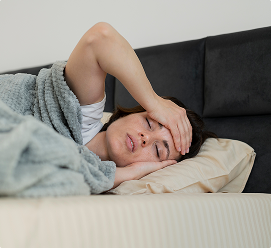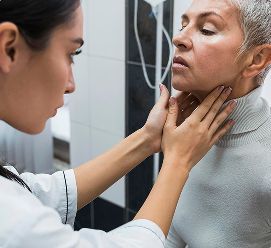If you’re nearing middle age and on the cusp of menopause—a phase called perimenopause—you may be experiencing symptoms associated with declining estrogen levels. Hot flashes, mood swings, diminished interest in sex, and many other symptoms may affect your quality of life. Customized estrogen therapy at our clinics in Louisiana and Mississippi boosts the levels of estrogen and other hormones that wane as you enter menopause.
Do You Need Estrogen Therapy?
Even though you may have friends or family members who experienced minimal menopause-related symptoms, that won’t necessarily be the case for you. Roughly 1.5 million women in the U.S. between the ages of 45 and 55 experience menopausal symptoms, often involving hot flashes, flushing, night sweats, and other uncomfortable physical and emotional reactions. Hormone therapy isn’t recommended for women older than 60.
How Does Estrogen Therapy Work?
Even though estrogen is the primary female sex hormone, hormone replacement therapy to treat menopause symptoms typically includes a combination of hormones.
Our hormone therapy specialists work with three main hormones for menopausal relief:
Estrogen: One of the most instrumental hormones for maintaining female health. It’s responsible for developing the female characteristics of the body. During menopause, estrogen levels plummet to one-tenth of what they are during your 20s.
Progesterone: This sex hormone is involved in the menstrual cycle, pregnancy, and embryogenesis (the forming of an embryo). It is coupled with estrogen treatments to protect your body and boost the estrogen’s effectiveness. Progesterone helps prevent the potential side effects that could come with estrogen therapy (such as excessive uterine lining growth, which can contribute to a higher risk of cancer).
Testosterone: While commonly known as a male sex hormone, testosterone actually plays an important role for both men and women. It impacts your cognitive function, libido, and overall energy levels. Supplemental testosterone can help sharpen your mind and stabilize your mood during menopause.
Hormone therapy for women who have had a hysterectomy usually only involves estrogen.

What Can Estrogen Do for You?
Estrogen therapy at Rejuvime Medical offers you a treatment path designed to address your specific symptoms. The most common symptoms include:
- Hot flashes
- Night sweats
- Vaginal dryness
- Mood swings
- Brain fog
- Trouble sleeping
- Weight gain
- Decreased libido
- Urinary urgency
Unsure of Where to Start?
Take the first step toward feeling your best. Fill out the form to explore personalized hormone and weight loss treatment
Rejuvime Medical
Look better, feel stronger, and live with renewed confidence.
(225) 960-1580
Locations Across Louisiana and Mississippi
How is Estrogen Therapy Administered?
The form of administration varies with estrogen therapy and depends on the specific symptoms the treatment is targeting. Estrogen can be delivered via pills, creams, or pellets. If you’re prescribed progesterone, it may be combined with estrogen in a pill but will more likely be given separately to prevent breakthrough bleeding.
Our hormone specialists customize your estrogen therapy after conducting blood tests and then monitor your progress and make adjustments as needed.
When Do I Notice Changes?
Symptom relief occurs gradually, and you may not even notice the changes at first. It typically takes weeks or months to recognize that you’re experiencing fewer symptoms and that your quality of life has improved. Even though it can seem like a long time before HRT begins to work, the benefits can last indefinitely.




What is the Duration of Estrogen Therapy?
How long you remain on HRT depends on your personal risk factors and symptoms. Most women experience the worst symptoms during the first few years of menopause. Over time, as your symptoms improve, we can taper the dose and eventually stop HRT.
Is Estrogen Therapy Safe?
An influential study published 20 years ago led to much confusion about the safety of hormone replacement therapy to treat menopause symptoms.
Ensuing research, however, demonstrated the
health benefits of HRT generally outweighed the risks. A joint statement from the North American Menopause Society, the American Society for Reproductive Medicine, and The Endocrine Society declared that hormone therapy is an acceptable option for relatively young (up to age 59 or within 10 years of menopause) and healthy women who are bothered by moderate to severe menopausal symptoms.

5 Star
Patient Reviews
Great people and very professional! Friendly, quick, and informative. They explain everything clearly.
Review from Google
Colten
I joined Rejuvime a few months ago and couldn’t be happier. The team provides excellent service.
Review from Google
Patricia
The staff took time to explain how the programs work. Highly recommend Rejuvime!
Review from Google
Dallas
Locations
Find a Location Near You
List of Services
-
Baton Rouge (Jefferson) Write a description for this list item and include information that will interest site visitors. For example, you may want to describe a team member's experience, what makes a product special, or a unique service that you offer.List Item 1
-
Baton Rouge (Highland) Write a description for this list item and include information that will interest site visitors. For example, you may want to describe a team member's experience, what makes a product special, or a unique service that you offer.List Item 2
-
Covington Write a description for this list item and include information that will interest site visitors. For example, you may want to describe a team member's experience, what makes a product special, or a unique service that you offer.List Item 3
-
D'Iberville (MS) Write a description for this list item and include information that will interest site visitors. For example, you may want to describe a team member's experience, what makes a product special, or a unique service that you offer.
-
Houma Write a description for this list item and include information that will interest site visitors. For example, you may want to describe a team member's experience, what makes a product special, or a unique service that you offer.
-
Lafayette Write a description for this list item and include information that will interest site visitors. For example, you may want to describe a team member's experience, what makes a product special, or a unique service that you offer.
-
Lake Charles Write a description for this list item and include information that will interest site visitors. For example, you may want to describe a team member's experience, what makes a product special, or a unique service that you offer.
-
Metairie Write a description for this list item and include information that will interest site visitors. For example, you may want to describe a team member's experience, what makes a product special, or a unique service that you offer.
-
Monroe Write a description for this list item and include information that will interest site visitors. For example, you may want to describe a team member's experience, what makes a product special, or a unique service that you offer.
-
Prairieville Write a description for this list item and include information that will interest site visitors. For example, you may want to describe a team member's experience, what makes a product special, or a unique service that you offer.
-
Shreveport Write a description for this list item and include information that will interest site visitors. For example, you may want to describe a team member's experience, what makes a product special, or a unique service that you offer.
-
Slidell Write a description for this list item and include information that will interest site visitors. For example, you may want to describe a team member's experience, what makes a product special, or a unique service that you offer.
Providers
Rejuvime Medical Providers
List of Services
-
Breanna Berard, FNP-BC Write a description for this list item and include information that will interest site visitors. For example, you may want to describe a team member's experience, what makes a product special, or a unique service that you offer.
-
Mariah Butcher, FNP- C Write a description for this list item and include information that will interest site visitors. For example, you may want to describe a team member's experience, what makes a product special, or a unique service that you offer.List Item 1
-
Ebony Eaglin, FNP-C Write a description for this list item and include information that will interest site visitors. For example, you may want to describe a team member's experience, what makes a product special, or a unique service that you offer.
-
Anna Fisher, FNP-C Write a description for this list item and include information that will interest site visitors. For example, you may want to describe a team member's experience, what makes a product special, or a unique service that you offer.
-
Claudia Guepet, FNP-C Write a description for this list item and include information that will interest site visitors. For example, you may want to describe a team member's experience, what makes a product special, or a unique service that you offer.
-
Alli Hansell, FNP-C Write a description for this list item and include information that will interest site visitors. For example, you may want to describe a team member's experience, what makes a product special, or a unique service that you offer.
-
Marisol Jobe, FNP-C Write a description for this list item and include information that will interest site visitors. For example, you may want to describe a team member's experience, what makes a product special, or a unique service that you offer.
-
Braiden Karasoulis, FNP-C Write a description for this list item and include information that will interest site visitors. For example, you may want to describe a team member's experience, what makes a product special, or a unique service that you offer.List Item 2
-
Rosalind Kenny, FNP-C Write a description for this list item and include information that will interest site visitors. For example, you may want to describe a team member's experience, what makes a product special, or a unique service that you offer.List Item 3
-
Lacee May, FNP-C Write a description for this list item and include information that will interest site visitors. For example, you may want to describe a team member's experience, what makes a product special, or a unique service that you offer.
-
Mallory McKernan, FNP-C Write a description for this list item and include information that will interest site visitors. For example, you may want to describe a team member's experience, what makes a product special, or a unique service that you offer.
-
Taylor Parrish, FNP-C Write a description for this list item and include information that will interest site visitors. For example, you may want to describe a team member's experience, what makes a product special, or a unique service that you offer.
-
Amy Patterson, FNP-C Write a description for this list item and include information that will interest site visitors. For example, you may want to describe a team member's experience, what makes a product special, or a unique service that you offer.
-
Katherine Phillippi, FNP-C Write a description for this list item and include information that will interest site visitors. For example, you may want to describe a team member's experience, what makes a product special, or a unique service that you offer.
-
Michelle Walker, FNP-C Write a description for this list item and include information that will interest site visitors. For example, you may want to describe a team member's experience, what makes a product special, or a unique service that you offer.
Start Your Journey to Better Health Today!
Take the first step towards a vibrant, healthier you with Rejuvime Medical.
Contact Us
Start Your Journey
People concerned about age-related health issues travel to one of Rejuvime Medical’s multiple locations in Louisiana and Mississippi for hormone replacement therapy. If you’re experiencing symptoms associated with hormonal imbalances, you can get more information about your treatment options.
BLOG









